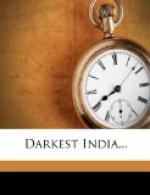The establishment of our Labor Yards will greatly help us in finding work for this class, without branding them with the perpetual stigma of their crime. The chief difficulty in the working of these Homes consists in the almost insuperable objection of the men to be known as criminals after their release from jail. This is of course perfectly natural. Besides, it is important that we should hold out before them hopes of bettering themselves by their good conduct, and earning an independent and honest livelihood at no distant date. When once our Labor Yards and Farm Colonies are in active operation, we shall be able to do this for our rescued criminals, continuing at the same time the fatherly supervision and help which they so very much need.
The following quotations from our last annual report will serve to explain this branch of our work, and to give a glimpse of the encouraging success with which we have already met in our efforts to reach and reform the criminal classes.
COLOMBO PRISON GATE HOME.
Picturesquely situated among palm trees in one of the most beautiful suburbs of Colombo, within easy reach of the principal city jail, is our Sinhalese Prisoners’ Home. Cinnamon Gardens, as the district is called, forms one of the attractions of Colombo, which every passing visitor is bound to go and see. The beauty of the surroundings must be a pleasant contrast to those dull prison walls from which the inmates have just escaped. Still more blessed and cheering must be the change from the Warder’s stern commands to the affectionate welcome and kindly attentions of the red-jacketed Salvationists, who have the management of the Home.
A bright lad who is on duty in the guard-room opens the gates and introduces you to the grounds in which the quarters are situated. There are groups of huts with mud walls and palm-leaf thatching, which have a thoroughly Indian and yet home like appearance. The first few of these are occupied as workshops or carpentry for the manufacture of tea boxes, and here from early to late the men may be seen busily employed, sawing, planing, measuring, bevelling, hammering and working with such a will that you might imagine their very lives depended on it, or at least that they must be making their fortunes out of it, whereas they are not being paid at all, and all the profits of the manufactory go towards the support of the Home!
“What I admire about your work,” observed Sir Athur Gordon, the late Governor of Ceylon, “is the way in which your Officers identify themselves with these convicts, and live among them on terms of perfect equality.”
But I was describing the little colony. On the left of this group of workshops is a neat little hut where Captain Dev Kumar and his young bride, Captain Deva Priti, reside. What a change for them form the English Homes to which they have been accustomed, to this little jungle hut, surrounded as they are continually by a band of ex-convicts, and criminals. Yet it would be hard to find a happier couple in the island,—in fact, quite impossible outside the Salvation Army.




